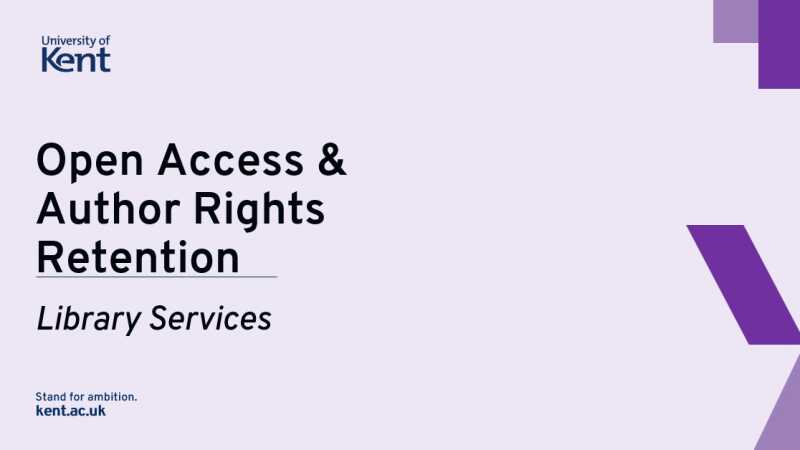What is Author Rights Retention?
From 1 August 2025, our institutional Research Publications policy came into effect. This includes an Author Rights Retention approach.
The Author Rights Retention approach:
- Allows authors to share and archive their manuscripts where they choose.
- Gives authors more control over the dissemination of their research.
- Makes it easier to meet the requirements of the next REF and of UKRI and other funders.
- Bypasses barriers introduced by publisher policies.
- Reduces situations where an author’s chosen publication outlet stops them from achieving the benefits of open access.
How does this affect Kent authors?
Author Rights Retention enables Kent researchers to:
- Retain rights over the Author Accepted Manuscripts (AAMs) of their journal articles and conference proceedings.
- Make these versions available on the Kent Academic Repository with a CC BY licence.
The policy applies to all authors or co-authors who are University of Kent staff members and to PGR students.
It is important to note that any third-party copyright material included in AAMs does not fall under the scope of the policy. See our FAQ on third-party content for more information.
What do authors need to do?
We have contacted publishers directly about the Author Rights Retention policy. Authors are not legally required to do anything to make use of the policy. However, the following text is recommended to be included in the funding acknowledgement section of the manuscript and on any cover letter/note accompanying the submission in order to reaffirm the rights retained by authors in their work:
- For the purpose of open access, the author(s) has applied a Creative Commons Attribution (CC BY) licence to any Author Accepted Manuscript version arising.
Some funders may require different wording but with the same intended outcome.
On acceptance, authors should upload their AAMs to KAR. The Library Services team can do this for you through the REF Assisted Deposit service. The AAM will be made openly available with a CC BY licence when the Version of Record is published on the publisher site.

Our How to publish OA at Kent form takes you through the steps to implement Author Rights Retention and ensure your article meets Open Access requirements. It provides links to the Kent resources and services available to you.
Why have we taken this approach?
Having an approach to Author Rights Retention within Kent's institutional Research Publications policy makes Open Access simpler and easier for staff to meet REF and funder requirements.
As part of the implementation of the policy, we have contacted publishers that Kent authors publish with to give them prior notice of both the retention of copyright over author’s accepted manuscripts, and the subsequent CC BY licence applied. This provides Kent authors reassurance that even when they are publishing the version of record behind a paywall, the AAM can be made openly available via our repository immediately on publication.
Some research funders, such as UKRI, are increasingly requiring immediate open access for any of their funded articles and conference proceedings, with requirements for chapters also developing. An institutional policy therefore provides reassurance to authors that they will always be able to comply with potential requirements for immediate open access regardless of where they publish.
Additionally, an Author Rights Retention approach supports our institutional commitment to being “as open as possible and as restricted as necessary”, as outlined in our University of Kent Statement on Open Research, and allows for wider benefits of open access.
Are there any exceptions?
It is possible to encounter situations in which it is difficult for authors to follow an Author Rights Retention approach. Exceptions include, but are not limited to, cases where:
- An author does not have permission to share the AAM with a CC BY licence immediately on publication because of lack of agreement from co-authors.
- The work contains a substantial amount of third-party materials which cannot be licensed with a CC BY licence and the removal of them would compromise the reading of the work.
- The author has already applied for a Wellcome/UKRI licensing exception.
In such cases, it will be permissible for staff to voluntarily opt-out of the requirement for immediate open access upon publication, or the assignation of a CC BY licence. However, this may cause the research output to be non-compliant with funder policies and future research assessments.
To discuss cases where it is not possible to comply with the policy, and for further help and advice, authors should contact us as soon as possible.
FAQs
Rights retention is a growing movement in the UK and beyond, and a large number of universities now have, or are developing, similar policies. Throughout this movement, it has not been seen that publishers are rejecting papers based on authors retaining copyright in their AAMs and sharing them immediately on publication. We therefore feel confident in saying it is unlikely a publisher would reject a paper based on our policy, and would ask you to contact us if this becomes a problem.
It allows you to meet the Open Access policy for REF 2029 without having to pay for an APC. If you publish in a journal that is not covered by one of our Read and Publish agreements, your Author Accepted Manuscript can still be made openly available in KAR with a CC BY licence as soon as the Version of Record is published on the publisher’s page. You do not need to use an embargo. This enables you to meet the REF OA requirements that apply from January 2026 onwards when the permitted embargoes become shorter.
This isn’t a problem. If your paper is eligible to use our read and publish agreements or UKRI block grant to pay for open access publishing, or if you’re publishing open access with no cost, then the wording/statement won’t have an effect. In these situations, you would already be retaining copyright to both the authors accepted manuscript and the version of record. You must still add the record to KAR and we recommend you send us the AAM upon acceptance
When you publish open access via the publisher’s website, the version of record (final published version) is freely available to be read, downloaded, and reused from this website. There are no subscriptions, payments, or log-ins required to access these publications. You can publish your work this way by either choosing a journal that is covered by one of our read and publish agreements, by applying to use the UKRI Open Access block grant, or by publishing in a diamond open access journal where it is free to publish openly.
In contrast, rights retention allows the authors accepted manuscript version of the publication to be made open access via a repository immediately on publication. This is the version after peer review, but before journal formatting, typesetting, etc. has taken place. The Author Rights Retention Policy therefore allows authors to share and reuse their accepted manuscripts without needing to pay a publishing fee.
It’s important to let any co-authors know about our Author Rights Retention Policy before submission. You may find if they are co-authors from another UK University that they have their own similar policy. If your co-authors do not agree to the authors accepted manuscript being licensed CC BY and shared immediately on publication, you can opt out of the policy.
Any third-party copyright material included in AAMs does not fall under the scope of the policy. Research outputs publishing under a Creative Commons licence can include third-party materials (such as images, photographs, or maps) that are subject to a more restrictive licence, however you may need to seek permission for this kind of reuse. Where the work contains a substantial number of third-party materials which cannot be openly licensed, and where the removal of these materials would compromise the experience of the reader, or otherwise diminish the value of the work, you would be able to opt out of the policy.
Long form works including monographs, edited collections, and non-funded chapters are not within scope of this policy, unless a funder has mandated open access in respect to this scholarly material. However, authors are encouraged to make all works as open as possible. While rights retention is not so common in the publication of long form outputs as of yet, authors can use the following wording to assert their rights over their manuscript:
- For the purpose of open access, the author(s) has applied a Creative Commons Attribution (CC BY) licence to any Author Accepted Manuscript version arising.
The University’s IP Policy states that the University owns the IP of all staff employed on a formal contract of employment. Similarly, it requires students to assign to the University IP developed while at the University. However, in accordance with normal academic practice, the University waives this right in relation to copyright in scholarly output produced by staff or students in the course of their employment or research work. The University does not claim copyright in scholarly outputs. Under the University’s Research Publication Policy and an Author Rights Retention approach, the University requires staff and students to retain ownership of these rights in journal articles and conference proceedings and not hand them over to publishers. The University retains a non-exclusive, irrevocable, worldwide licence to make the accepted version of an article or conference proceeding available in KAR under a CC BY licence.
Yes, any author can opt out of the policy if they feel there is reason to. However, opting out may result in non-compliance with funder policies and potentially make the publication ineligible for REF-submission. If you have any questions, please contact us.
Acknowledgement
With thanks to the University of Essex. We re-used and adapted content from their webpages in the creation of this Kent guide in September 2025.
